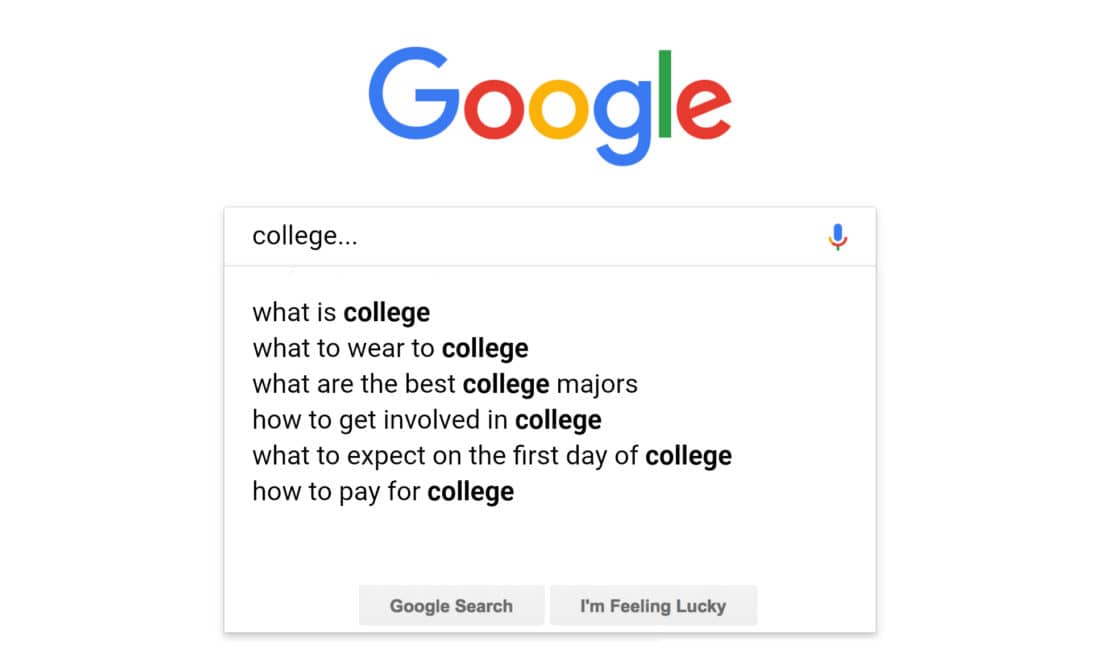Top 6 Questions Students Google before Going to College, Answered.
1. How to pay for college?
We get it, paying for college is one of the first fears to pop into your mind before even enrolling. And while college is notoriously expensive, it’s worth the money. So much of your future is influenced by these next four years. You shouldn’t have to worry about finances so much that you forget to make the most of the experience itself! Making connections and building your post-graduate résumé should be your priority. The more you get involved in college, the better the value of your school.
As you work hard in class, make a point to apply for scholarships & grants. There’s no reason not to invest time in looking for free money toward your education. Students all over the nation are taking advantage of scholarships by documenting their activism, community service, and other achievements year round. For help finding scholarships, you can use resources like Scholly or other local listings for rewards in your area.
And of course, one way to get yourself more financially stable is to get a small part-time job. As long as you manage your time well, you can efficiently earn extra money while succeeding in class. What’s more, a part-time job could even help you practice your people skills and out-of-classroom experience.
2. What are the best college majors?
Choosing a major is a big decision. At first, settling on a major may feel like you’re locking yourself into one possible future for the rest of your life, but the road truly isn’t as narrow as it seems. Today’s market is now so diverse and demanding that many job descriptions include skills that are a combination of roles and responsibilities. No job is one specific thing anyway! When asking yourself what to major in, ask yourself: “What primary skills will I need to have? What baseline knowledge do I need to secure the kind of job I want?”
Even if you’re still not sure about what to study, it’s okay to be undecided about your major. You can earn your prerequisites in your general education courses as you explore different fields. Devote room in your schedule to trying out various areas of study in electives and summer internships. As you look around, you may get nudged in a direction you might not have considered. It’s also crucial that you meet regularly with your school counselor so that you can explore while staying on track to graduation.
3. What is college?
Especially for first-generation students, it can be hard to know what to expect from college. And with the rise of the digital age and social media, people hear from more and more people that college might not even be worth the time and money. But here’s what you should keep in mind: college is what you make of it.
You’re in control of your own future—earning your degree is the obvious end goal, but the memories, connections, skills, and knowledge you will gain are all what makes college such an important experience. Some will say college is where you go to earn a degree. Others will define it as a place to find yourself. You’ll know the answer to this question when you finish, because what the essence of college is will vary for everyone.
Don’t worry. It’s okay to be nervous—even scared—but you’ll be fine.
4. What to expect on the first day of college?
The first day of college usually goes like this: You wake up early, get dressed, grab your bag, and head to your first class. You might even get there early and choose a good seat. Your professor will begin class with a welcome and then proceed to review the syllabus and expectations for that entire semester. This is where you should start taking notes, because every professor structures their class differently. Some professors may even start teaching on the first day, so be prepared with a laptop or notebook. On this first day, come prepared with questions to set yourself up for success: do I need all the textbooks listed on the syllabus? Do I need the latest edition of the book, or can I rent or buy an older (and cheaper!) one? A lot of the college experience is still a mystery to you, so find out all you can as early as you can. You’ll have some time between classes, so make a point to wait until the crowd clears to introduce yourself to your professor. Shake their hand and share your name; build that relationship from the start!
Once you’ve finished all your classes for the day, you’ll have plenty of free time to explore your new home. You might want to learn where your classes will be for the rest of the week, or maybe you’d like to visit such common areas as the rec center or dining hall. If you’re not sure where to start, check your school’s social media pages or calendar; there are likely to be fun beginning-of-the-year events going on all around campus.
5. What to wear to college?
The first day of class is when you make your first impression on both your peers and your professors, so it’s no wonder why you might be stressing about how to dress your best. Dress in whatever makes you look well groomed and whatever makes you feel confident. It would be a safe bet to dress in your best casual attire; you might have to walk a lot between classes, so your best outfit might be as simple as a comfortable shirt, jeans, and flats or sneakers.
6. How to get involved in college?
Most institutions have countless communities, clubs, and organizations that cater to any student’s interests. No matter your passions, you’re sure to find some peers who would love to share them with you. Here are some resources you can use to find extra-curricular activities that will really make college your home away from home:
- Visit the Student Activities Center
Information about student organizations or activities is usually found on every school’s website. Dig around, and you can find a full list of registered student groups on your campus. Once you found the group you’re looking for, send them a message via social media or attend their general meetings. You can even found your own group. Most colleges allow students to start their own organizations, so find some friends and apply to start something new. Just like that, you’re well on your way to becoming a leader in your college community.
- Look for Flyers
Student-led groups are always looking for new members, so they’re always post flyers about upcoming meetings all around campus. Check public bulletin boards or other crowded areas for information and invitations.
- Ask Around
Word of mouth is one of the quickest ways to learn about what people are doing outside of class. Talk to someone sitting near you in class or even seek out upperclassmen in places like the dining hall or student union. You just might make a friend who’ll lead you to a life-changing community of peers. Your RA and advisor are also a great resource; after all, their job is literally to help you have the most positive time at school.
There you have it; the top 6 things students google before going to college. But no matter how much you prepare, how many questions you ask, or how much advice you receive, starting college is your own individual learning experience. You’ll have some highs and lows. You’ll feel homesick some days, and you’ll feel completely liberated and joyful on others. It’s all part of an amazing growing experience in your transition to adulthood, so embrace every moment.
If you have any other questions, reach out to us on Twitter or check out our student resource section!



